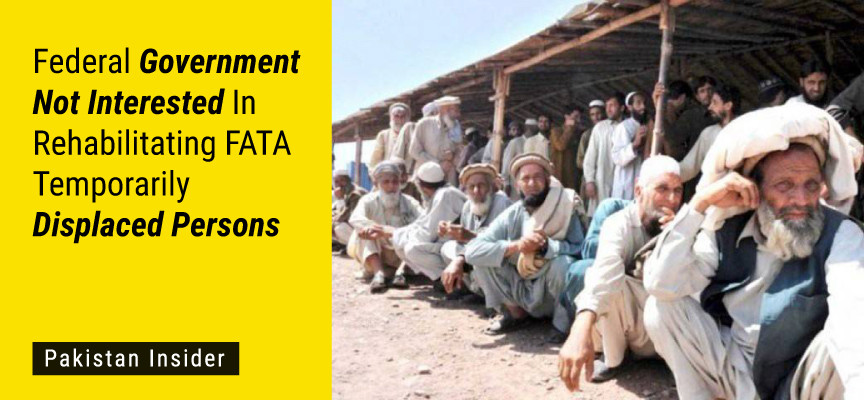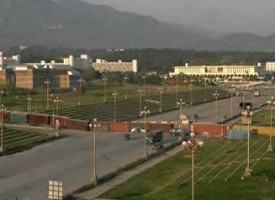According to statistics published by the South Asia Terrorism Portal (SATP), an estimated 150,000 families were displaced by Pakistan Army’s counter terrorism operations in FATA, predominantly in North Waziristan Agency and Khyber Agency. To be more specific, data provided by the FATA Disaster Management Authority (FDMA) on October 5, 2015 showed that there were 638,144 Temporarily Displaced Persons (TDPs).
Operations Zarb-e-Azb and Khyber were launched with the full support of Pakistani citizens to uproot the command and control centres of anti-state militants once and for all. The latter was conducted in two phases between October 2014 and July 2015 whereas the former has been ongoing since June 2014. Zarb-e-Azb is nearing its two year mark with significant achievements to its credit. But it is the subsequent post-war efforts i.e. the restoration of battle grounds and rehabilitation of displaced persons are near zero, to say the least.
The federal government in Islamabad has exhibited persistent negligence whenever calls for restoration of FATA were raised by allies and critics alike. Major infrastructure has unfortunately been destroyed or rendered hazardous and a significant number of homes belonging to war-affected persons have also been damaged. In such circumstances, shouldn’t the federal government prioritize the immediate return of TDPs by releasing funds for their rehabilitation?
The following broad categories of development have been receiving the government’s focus more than any other issue. I’m sure no reader will disagree with the findings:-
• Transport and Town Planning Infrastructure
• Alternative Energy Production
• Regional geo-economics
On the other hand, the following areas of concern haven’t received any noteworthy attention:-
• Education
• Health
• Counter Violent Extremism
• Disaster Management
• Climate Change
• Legal Reforms
• IT & Telecom Advancement
Rehabilitation is an important follow-up to disasters, whether they are man-made or natural. The Finance Ministry has been chest-thumping since long about increasing the state revenue but it seems reluctant on releasing funds for TDPs. A damning report recently published by Ayaz Nabi for The News International highlighted that only 15-20% of the Rs. 80 billion allocated by the federal government during this financial year were released. The military leadership expressed serious concerns of delays in issuance of funds for development work. Where are the remaining billions and why are they being delayed for so long?
Perhaps another question might help in understanding the bigger picture; why does NACTA still suffer from fund delays? The answer to these and other questions can be acquired after we first accept the fact that the Nawaz Sharif-led government in Islamabad is a “business-centric” government which is more concerned with Public-Private Partnership (PPP) projects than ensuring effective and across-the-board governance. It wouldn’t be wrong to add that the federal government is being run more like a “public corporation” instead of a government.
Displaced persons belonging to FATA are getting increasingly upset with the federal government’s lack of interest in repatriating them. They have the right to ask what benefit they received by sacrificing their lives, property and wealth for Pakistan’s national security.
This is why projects such as the Metro Bus, Orange Line Train Project and LNG terminals are given more preference than pressing issues requiring urgent national attention. In short, Islamabad has severely misplaced priorities and observers argue that this “misplacement” can no longer be labeled the outcome of utter ignorance. It isn’t.
In October 2015, the Ministry of Information, Broadcasting and National Heritage put up a Request For Proposal (RFP) seeking a credible nationwide survey to assess how citizens perceive the government’s performance. One cannot help wondering why the government continues to play dumb. It knows well the amount of grievances bubbling within neglected people in FATA, Balochistan and Gilgit-Baltistan (GB). Conveniently, it has decided to look elsewhere and stay on its (dangerous) course.
In December 2015, the military’s mouthpiece ISPR claimed that only 38% of the TDPs were repatriated. Army chief General Raheel Sharif directed concerned personnel to ensure the timely and dignified return of TDPs at the earliest possible. We have to honestly ask ourselves, why should Pakistan Army carry this additional burden of post-war rehabilitation? If such a high-priority matter is also given to the army, why not let it run the entire affairs of the country? Why then must the Prime Minister and his aides shed crocodile tears over short-lived tenures of the past which were overturned by dictators?
Displaced persons belonging to FATA are getting increasingly upset with the federal government’s lack of interest in repatriating them. They have the right to ask what benefit they received by sacrificing their lives, property and wealth for Pakistan’s national security. Certain sub-nationalist political parties sympathetic to hostile neighbors are adding fuel to the fire in such circumstances.
The citizens of Pakistan should pressurize the regime in Islamabad to designate the rehabilitation of FATA TDPs as its top priority. In the long run, if we fail to win the hearts and minds of our countrymen, we dare not blame outsiders.
image credit: tribune.com.pk








No comments!
There are no comments yet, but you can be first to comment this article.